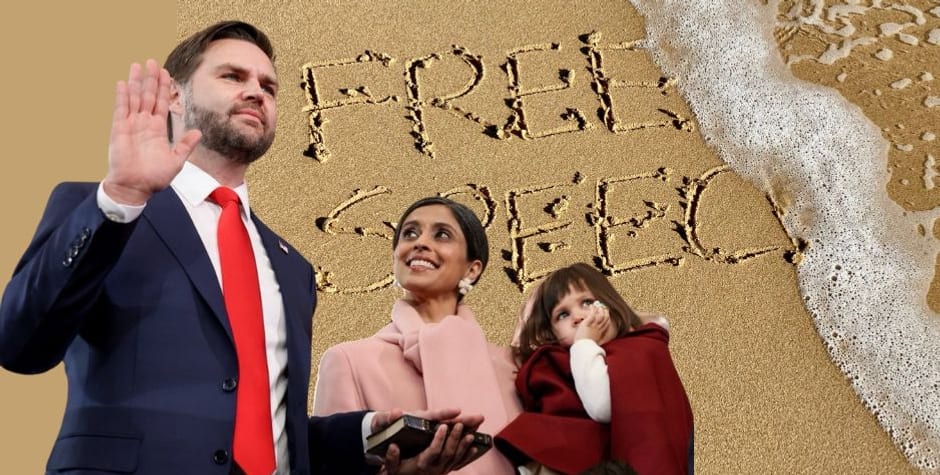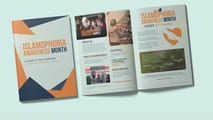JD Vance, Vice President of the United States, delivered a speech last week in Munich (Germany), pointing out some threats to freedom of speech in Europe. As he said, the fight against “hate speech” is often used as a pretext to justify censoring politically or religiously “incorrect” statements.
In 1963, U.S. President J. F. Kennedy supported freedom through his famous speech in Berlin, Ich bin ein Berliner. In 2025, it is through the voice of JD Vance that the U.S. promotes fundamental freedoms in Europe.
JD Vance’s comments align with the battles the ECLJ has been waging for several years to defend freedom of speech, in particular before the European Court of Human Rights (ECHR), the United Nations and French institutions. Over the last years, the ECLJ has observed and opposed a backsliding in freedom of speech. We can attest that JD Vance’s statements are entirely justified and not exaggerated.
Restrictions on Christian “proselytizing”
Greece bans proselytism in general in its Constitution, in Article 13-2: “Proselytism is forbidden.” The ECLJ intervened as amicus curiae in a couple of cases before the ECHR to defend the freedom of Christians to spread the Gospel. In the most recent case, the applicant was convicted because he told one of his friends about his belief. This conviction occurred despite his friend testifying before the court that he was completely free to embrace the Christian faith.
The ECLJ is also an amicus curiae in a pending case before the ECHR, Velev and others v. Bulgaria (No. 56007/21), concerning the ban in Bulgarian municipalities on door-to-door canvassing solely for religious reasons.
The list of cases and threats of prosecution just goes on. The Christian religion is the only one not to benefit from any specific Council of Europe or European Union mechanism against hatred and discrimination.
Restrictions on pro-life speech
JD Vance denounced in his speech the British “buffer zone” law, which criminalizes silent prayer and other actions that could influence a person’s decision within 200 meters of an abortion facility.
Such laws censoring pro-life speech are very common in Europe. As an illustration, in France, a crime has been introduced in 1993 and then expanded by successive governments: the “crime of obstructing abortion.” This crime prohibits to attempt to prevent a woman from having an abortion, even online. However, it is totally permitted to attempt to prevent a woman from continuing her pregnancy. Many women thus say they felt forced to abort because of pressure from the child’s father or Planned Parenthood, and because of the censorship of pro-lifers.
Restrictions on speech critical of Islam
In its case-law, the ECHR condemns “Islamophobia”, equating it with anti-Semitism and racism,[1] even though these phenomena are distinct: unlike religion, which is a matter of free individual choice, race is not a choice, but a reality imposed on the individual. On the other hand, the ECHR has never condemned “Christianophobia” or “Judeophobia”.[2]
Regarding criticism of religions in general, the ECHR’s case law has been criticized for its inconsistency, due to divergent solutions that are difficult to explain in legal terms.[3] Islam is often favored over Christianity and Judaism in these rulings.
In 2018, the ECHR approved the conviction of Ms Sabaditsch-Wolff, a lecturer, for having assimilated the union of Mahomet with Aisha who was only 9 years old, to pedophilia (E.S. v. Austria, No. 38450/12, 25 Oct. 2018). The ECHR considered Ms Sabaditsch-Wolff’s comments to be “capable of arousing justified indignation” of Muslims, deeming them to constitute “a malicious violation of the spirit of tolerance, which was one of the bases of a democratic society” liable to “putting religious peace at risk.” This case had prompted strong reactions. The highest Islamic authorities saw this as an approval of their repression of blasphemy. The ECLJ was an amicus curiae and had a major role in this case.
Similarly, the United Nations Human Rights Council, in resolutions passed in the 2000s[4], called for the criminalization of “defamation of religions”, which is “an affront to human dignity” and consists in particular of disseminating “negative stereotypes”. These resolutions were introduced by the Organization of Islamic Cooperation (OIC). Ahmed Shaheed, a former Special Rapporteur on freedom of religion, also published a report entitled “Combating Islamophobia” (2021), which echoed an OIC objective.
In 2023, the Human Rights Council passed a resolution that “condemns and strongly rejects the recent public and premeditated acts of desecration of the Holy Qur’an” and calls on states to prevent and punish such acts. The resolution describes them as “acts of religious hatred” and calls for their prohibition on this basis. The resolution had been proposed by Pakistan and Palestine on behalf of the 57 member states of the OCI. The resolution was tabled in response to the desecration of the Koran by Salwan Momika, who has since been assassinated, in late January 2025, as mentioned by JD Vance in his speech.
Restrictions on speech critical of Arab-Muslim immigration to Europe
The ECHR has upheld the convictions of Éric Zemmour, a French politician, and CNEWS, France’s leading news channel, for comments critical of immigration.
Éric Zemmour was convicted for having denounced an “invasion,” “colonization,” and the “struggle to Islamizing a territory,” as well as for the statement “I think they should be given the choice between Islam and France” (Zemmour v. France, No. 63539/19, 20 Dec. 2022).
CNEWS was convicted twice, firstly for a speech saying “Immigration, Islam, and Islamism, they’re all the same subject,” while referring to the need to take “radical measures” against immigration (CNEWS v. France (dec.), No. 60131/21, 7 Nov. 2023), and secondly for another speech comparing migrants to “thieves,” “rapists,” “murderers,” and “invaders” (CNEWS v. France (dec.), 52837/22, 19 Dec. 2024).
A challenge for conservatives in Europe
Why is Europe taking such a bad path regarding free speech? In addition to the common explanation of the cultural differences between the US and Europe in terms of freedom, the main explanation remains political. Parliaments in Europe are filled with what Americans call “RINOs”, Republicans in name only, who are afraid of opposing the left on this topic. They were and are still afraid of being labeled as “haters”, “fascists”, etc. and keep voting for laws restricting free speech.
We hope JD Vance’s speech will serve as a wake-up call for conservative parties across Europe, encouraging them to be more courageous and proactive in defending freedom of speech. In the meantime, the ECLJ will continue to fight for freedom of speech and to help the citizens who contact us to cope with censorship.
_______
[1] ECHR, Paksas v. Lithuania [GC], No. 34932/04, June 1, 2011, § 88 ; Leroy v. France (dec), No. 36109/03, Oct. 2, 2008, § 27; S.A.S. v. France [GC], No. 43835/11, July 1, 2014, § 149.
[2] “Guide on Article 17 of the European Convention on Human Rights – Prohibition of abuse of rights”, updated on 31 August 2024, pp. 35 à 44.
[3] Compare in particular the judgments in E.S. v. Austria (No. 38450/12, Oct. 25, 2018) with Mariya Alekhina and others v. Russia (No. 38004/12, July 17, 2018), Bouton v. France (No. 22636/19, Oct. 13, 2018), Sekmadienis Ltd. v. Lithuania (No. 69317/14, Jan. 30, 2018), Tagiyev and Huseynov v. Azerbaijan No. 13274/08, Dec. 5, 2019) and Rabczewska v. Poland (No. 8257/13, Sept. 15, 2022). See: BAUER, Nicolas, PUPPINCK, Grégor, « Discours antireligieux : libertés individuelles et obligations des États », Revue des deux Cités : Société, droit, politique et religion, Presses universitaires de Louvain, n°1, déc. 2023, pp. 173 to 176.
[4] Voir : HRC, resolutions “Combating defamation of religion”, E/CN.4/RES/1999/82, 30 Apr. 1999; E/CN.4/RES/2000/84, 26 Apr. 2000; E/CN.4/RES/2001/4, 18 Apr. 2001; E/CN.4/RES/2002/9, 15 Apr. 2002; E/CN.4/RES/2003/4, 14 Apr. 2003; E/CN.4 /RES/2004/6, 13 Apr. 2004; E/CN.4/RES/2005/3, 12 Apr. 2005; A/HRC/RES/4/9, 30 Mar. 2007; A/HRC/RES/7/19, 27 Mar. 2008; A/HRC/RES/10/22, 26 Mar. 2009; A/HRC/RES/13/16, 15 Apr. 2010. Voir aussi : UNGA, resolutions “Combating defamation of religion”, A/RES/60/150, Dec. 16, 2005; A/RES/61/164, Dec. 19, 2006; A/RES/62/154, Dec. 18, 2007; A/RES/65/224, Dec. 21, 2010.















